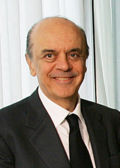The first round of the 2010 Brazilian presidential election was held on October 3, as part of the country's general election, with a second round between the two leading candidates on October 31. That happened because under Brazilian law, if none of the candidates receives more than a half of the valid votes, a run-off is held four weeks after the first round. [2] The leading candidate, Dilma Rousseff, received 46.9% of the first-round vote, thereby making a second round necessary.
In the election, Brazilian citizens eligible to vote chose their successor to then-President Luiz Inácio Lula da Silva, of the democratic socialist/social democratic Workers' Party. According to the Constitution, the president is elected directly to a four-year term, with a limit of two terms. Lula was hence ineligible for a third term, since he was elected in 2002 and re-elected in 2006. [3] The 2010 election marked the first time since the end of the military dictatorship that Lula was not a candidate for the presidency. [4]
Candidates overview
Since the earliest polls for president, former São Paulo Governor José Serra – candidate for the center-right [5] opposition group led by the centrist/Third Way [6] [7] Social Democratic Party – was ahead of Dilma Rousseff, pre-candidate for the ruling center-left bloc led by the Workers' Party. Rousseff, however, increased her popularity greatly, rising from 3% in March 2008 to 30% in March 2010. On the May 8, 2010 poll by Vox Populi, she finally surpassed Serra, achieving 37% of the voting intention.
Another potential candidate for the ruling center-left group was Ciro Gomes from the Brazilian Socialist Party, [6] who lost his comfortable second place in polls to Rousseff in May 2009. After that, he maintained an average of 12% of voting intention. On April 27, 2010, Gomes' party declined to launch his candidacy, instead supporting Rousseff. [8] In the left-wing opposition group, Socialism and Freedom Party's Heloísa Helena was the most likely candidate, but her name was withdrawn from polling after she decided to run for a seat in the Senate for Alagoas. [9] Plínio de Arruda Sampaio was her party's candidate for president. [9] Almost simultaneously, Marina Silva left the Workers' Party and joined the Green Party to run for president. [10] Prior to her candidature, she was well known internationally as a defender of the Amazon Rainforest, but was less known in her native Brazil. [6]
This page is based on this
Wikipedia article Text is available under the
CC BY-SA 4.0 license; additional terms may apply.
Images, videos and audio are available under their respective licenses.



